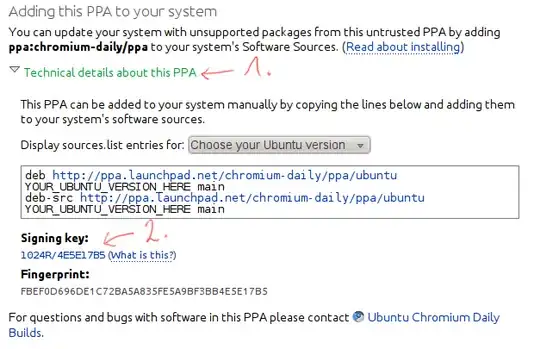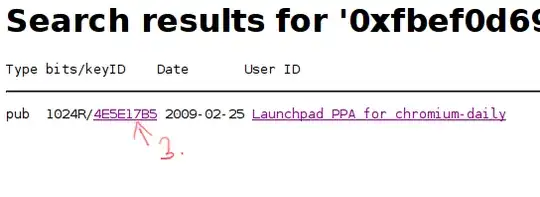Adding a key to /etc/apt/trusted.gpg.d is insecure because it adds the key for all repositories.
This is exactly why apt-key had to be deprecated.
Short version
Do similar to what Signal does.
If you want to use the key at https://example.com/EXAMPLE.gpg for a repository listed in /etc/apt/sources.list.d/EXAMPLE.sources, use:
sudo mkdir -m 0755 -p /etc/apt/keyrings/
curl -fsSL https://example.com/EXAMPLE.gpg |
sudo gpg --dearmor -o /etc/apt/keyrings/EXAMPLE.gpg
echo "Types: deb
URIs: https://example.com/apt
Suites: stable
Components: main
Signed-By: /etc/apt/keyrings/EXAMPLE.gpg" |
sudo tee /etc/apt/sources.list.d/EXAMPLE.sources > /dev/null
# Optional (you can find the email address / ID using `apt-key list`)
sudo apt-key del support@example.com
# Optional (not necessary on most systems)
sudo chmod 644 /etc/apt/keyrings/EXAMPLE.gpg
sudo chmod 644 /etc/apt/sources.list.d/EXAMPLE.sources
ℹ️ You can also embed the key directly into the .sources file! See the section "Embedding the key" below.
ℹ️ We're using the .sources format here, not the old .list format. This is supported on basically all systems today. See the section "Old one-line format" below for more info.
Long version
While the deprecation notice recommends adding the key to /etc/apt/trusted.gpg.d, this is an insecure solution, and deprecated as of apt 2.9.24 (released January 2025). To quote this article from Linux Uprising:
The reason for this change is that when adding an OpenPGP key that's used to sign an APT repository to /etc/apt/trusted.gpg or /etc/apt/trusted.gpg.d, the key is unconditionally trusted by APT on all other repositories configured on the system that don't have a signed-by (see below) option, even the official Debian / Ubuntu repositories. As a result, any unofficial APT repository which has its signing key added to /etc/apt/trusted.gpg or /etc/apt/trusted.gpg.d can replace any package on the system. So this change was made for security reasons (your security).
The proper solution is explained in that Linux Uprising article and on the Debian Wiki: Store the key in /etc/apt/keyrings/ (or /usr/share/keyrings/ if keys are managed by a package), and then reference the key in the apt source list.
Therefore, the appropriate method is as follows:
Create directory
Create the directory for PGP keys if it doesn't exist, and set its permissions.
This step explicitly sets the recommended permissions, just in case you've changed your umask using sudo's umask_override.
Creating the directory is actually only necessary in releases older than Debian 12 and Ubuntu 22.04, but it can't hurt to run this line either way.
sudo mkdir -m 0755 -p /etc/apt/keyrings/
Download key
Download the key from https://example.com/EXAMPLE.gpg and store it in /etc/apt/keyrings/EXAMPLE.gpg.
By giving options -fsSL to curl we enable error messages, ensure redirects are followed, and reduce output so you can see sudo's password prompt.
The Debian wiki explains that you should dearmor the key (i.e. convert it from base64 to binary) for compatibility with older software.
curl -fsSL https://example.com/EXAMPLE.gpg |
sudo gpg --dearmor -o /etc/apt/keyrings/EXAMPLE.gpg
Optionally, you can verify that the file you downloaded is indeed a PGP key by running file /etc/apt/keyrings/EXAMPLE.gpg and inspecting the output.
Register repository
A key has been added, but apt doesn't know about the repository yet.
To add the repository, you should create a .sources file in /etc/apt/sources.list.d/ that describes how to use the repository, and where to find the key.
(You may also have .list files in that directory.
See the section "Old one-line format" below for more info.)
The contents of the created .sources file should look something like this:
Types: deb
URIs: https://example.com/apt
Suites: stable
Components: main
Signed-By: /etc/apt/keyrings/EXAMPLE.gpg
The Signed-By field should link to the key you just downloaded.
If a repository wants you to specify an architecture, or you want to use multiple components (e.g. main contrib), the contents may instead be something like
Types: deb
URIs: https://example.com/apt
Suites: stable
Components: main universe
Architectures: amd64 i386
Signed-By: /etc/apt/keyrings/EXAMPLE.gpg
A "flat" repository doesn't work with suites and components, and instead specifies an exact path.
In the DEB822 format, this is represented by setting Suites: to that path, and omitting the Components: field entirely.
In this case, the Suites: field must end with a /.
For example:
Types: deb
URIs: https://example.com/apt
Suites: deb/
Signed-By: /etc/apt/keyrings/EXAMPLE.gpg
If you are adapting the file from an existing repo, they may be using the old one-line format instead.
See the section "Old one-line format instead" below for more info.
For more examples, see the sources.list(5) man pages.
(optional) Remove old key
If you previously added a third-party key with apt-key, you should remove it.
Run sudo apt-key list to list all the keys, and find the one that was previously added.
Then, using the key's email address or fingerprint, run sudo apt-key del support@example.com.
(optional) Force-set permissions
If you have a custom umask_override set for sudo, or if you use ACLs, files will be created with different permissions than usual.
In those cases, explicitly set permissions for EXAMPLE.gpg and EXAMPLE.list to 644.
Embedding the key
apt 2.3.10 and newer support embedding the public key directly in the sources.list.
You can check your version of apt by running apt -v.
Debian 11 "Bullseye" LTS (EOL: 2026-08-31) and Ubuntu 20.04 "Focal Fossa" (EOL: 2025-04-30) are too old, but Debian 12 "Bookworm" and Ubuntu 22.04 "Jammy Jellyfish" are good to go!
To embed a key, replace the path in Signed-By: /etc/apt/keyrings/EXAMPLE.gpg with the raw key, and delete the file /etc/apt/keyrings/EXAMPLE.gpg.
Importantly, you must indent each line of the key block by (at least) one space, and you must put an indented . instead of an empty line.
(Removing the empty line at the start of the key invalidates the key!)
For example, you may have a .sources file like below.
(Real keys should be much longer than this. This one is too short to be secure.)
Types: deb
URIs: https://example.com/apt
Suites: stable
Components: main
Signed-By:
-----BEGIN PGP PUBLIC KEY BLOCK-----
.
mI0EZWiPbwEEANPyu6pUQEydxvf2uIsuuYOernFUsQdd8GjPE5yjlxP6pNhVlqNo
0fjB6yk91pWsoALOLM+QoBp1guC9IL2iZe0k7ENJp6o7q4ahCjJ7V/kO89mCAQ09
yHGNHRBfbCo++bcdjOwkeITj/1KjYAfQnzH5VbfmgPfdWF4KqS/TmJP9ABEBAAG0
G0phbmUgRG9lIDxqYW5lQGV4YW1wbGUub3JnPojMBBMBCgA2FiEEK8v49DttJG7D
35BwcvTpbeNfCTgFAmVoj28CGwMECwkIBwQVCgkIBRYCAwEAAh4BAheAAAoJEHL0
6W3jXwk4YLID/0arCzBy9utS8Q8g6FDtWyJVyifIvdloCvI7hqH51ZJ+Zb7ZLwwY
/p08+Xnp4Ia0iliwqSHlD7j6M8eBy/JJORdypRKqRIbe0JQMBEcAOHbu2UCUR1jp
jJTUnMHI0QHWQEeEkzH25og6ii8urtVGv1R2af3Bxi9k4DJwzzXc5Zch
=8hwj
-----END PGP PUBLIC KEY BLOCK-----
The script below will create a new .sources file at /etc/apt/sources.list.d/EXAMPLE.sources with the key at https://example.com/EXAMPLE.gpg embedded into it:
echo "Types: deb
URIs: https://example.com/apt
Suites: stable
Components: main
Signed-By:
$(wget -O- https://example.com/EXAMPLE.gpg | sed -e 's/^$/./' -e 's/^/ /')" | sudo tee /etc/apt/sources.list.d/EXAMPLE.sources > /dev/null
# Optional (see above)
sudo apt-key del support@example.com
sudo chmod 644 /etc/apt/sources.list.d/EXAMPLE.sources
Old one-line format
Thus far, this answer has used the "new" DEB822 format (.sources files) to specify repositories, instead of the old one-line format (.list files).
The DEB822 format has been supported since apt 1.1 (released in 2015).
Debian and Ubuntu plan to use DEB822 as the default format starting late 2023.
Repolib's documentation has a nice comparison and covers the motivation behind the new format.
If you are running Debian 9 "Stretch" or newer, or Ubuntu 16.04 "Xenial Xerus" or newer, you're good to go!
This section is intended for those who cannot use DEB822, or for those who want to migrate to DEB822.
Using the old one-line format
The following script replaces the DEB822 script from the section "Short version", at the top of this answer.
sudo mkdir -m 0755 -p /etc/apt/keyrings/
curl -fsSL https://example.com/EXAMPLE.gpg |
sudo gpg --dearmor -o /etc/apt/keyrings/EXAMPLE.gpg
echo "deb [signed-by=/etc/apt/keyrings/EXAMPLE.gpg] https://example.com/apt stable main" |
sudo tee /etc/apt/sources.list.d/EXAMPLE.list > /dev/null
# Optional (see above)
sudo apt-key del support@example.com
sudo chmod 644 /etc/apt/keyrings/EXAMPLE.gpg
sudo chmod 644 /etc/apt/sources.list.d/EXAMPLE.list
Migrating to DEB822
If you can, you should migrate to DEB822, because that will be the default format in Debian and Ubuntu.
That said, as of February 2025, there is no urgency to migrate, because the old one-line format is not deprecated.
Since apt 2.9.24 (released January 2025), you can run apt modernize-sources to automatically migrate all your .list files to DEB822.
Note, however, that some fields, such as arch=... are not migrated correctly, so you must add Architectures: ... to your .sources file manually.
Fields with multiple values are space-separated, so multiple architectures would be written as Architectures: amd64 i386.
Additional resources

